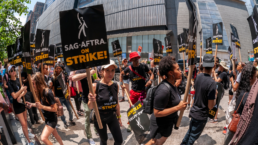Early 20th-century unions rejected the idea that bosses should be the dictators of the workplace. Today, the WGA, SAG-AFTRA, and other major unions have rediscovered the strike’s power to secure workers’ control over their own lives.
By Nick French, Jacobin
The eyes of America are on Hollywood this summer, but not for the usual reason: writers and actors for film and TV are shutting down production with their first joint strike since the 1960s. The Writers Guild of America (WGA), representing 11,500 writers, went on strike on May 2 and were joined on the picket line on July 14 by the 160,000-strong Screen Actors Guild (SAG-AFTRA).

In the public imagination, strikes are often considered to be fights where workers demand better pay or more generous benefits. These are common reasons for strikes, and indeed higher wages and residual payments are among the central demands in the current Hollywood walkout. But strikes are also one of unions’ most powerful weapons for fighting back against business owners and corporate managers who claim the right to run workplaces like private dictatorships.
Unions, in other words, need not only use strikes to demand a larger share of the pie that workers produce — they can also wield them to affect how workers make that pie.
WGA and SAG-AFTRA are doing that, too, in fighting for contract provisions that shape the nature of the work process. Writers are demanding that studios increase the minimum size of writers’ rooms on TV shows and agree to prohibitions on the use of artificial intelligence (AI) in the writing process. Actors, meanwhile, want protections against the use of artificial intelligence (AI)-generated likenesses and limits on the use of self-taped auditions.
Recent Posts
‘Unconstitutional. Unethical. Authoritarian.’ ICE Bars Millions Of Immigrants From Bond Hearings
July 18, 2025
Take Action Now One watchdog said the new policy “seems like a blatant attempt to stop them from exercising their right to due process.”……
Americans Are Not Nearly Alarmed Enough About Climate Change
July 18, 2025
Take Action Now Americans still don’t comprehend how imminent, dangerous, and far-reaching the threat is—and journalists are partly to blame.By…
The IRS Is Building A Vast System To Share Millions Of Taxpayers’ Data With ICE
July 17, 2025
Take Action Now ProPublica has obtained the blueprint for the Trump administration’s unprecedented plan to turn over IRS records to Homeland Security…
Israel’s Sudden Assault On Syria Is Unchecked Aggression
July 17, 2025
Take Action Now Jerusalem is bombing Damascus and threatening al-Sharaa’s rule, while Washington was hoping to help the nascent government on…




